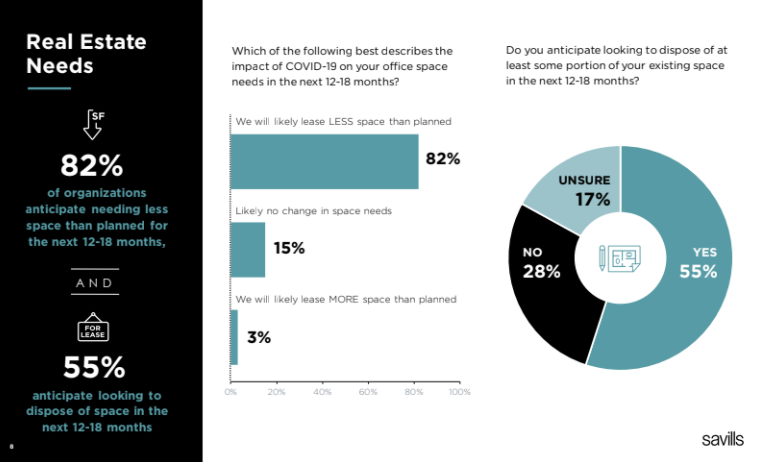Tech firms are planning to dump office space: study
More tech firms will shed office space during the COVID-19 pandemic.
Some 82% of tech firms anticipate needing less office space in the next 12-18 months, and 55% say they plan to actually get rid of at least some office space in that time period, according to a new survey of 250 U.S. tech companies by Savills, a London-based real estate services provider.
“Some companies are looking to dispose of or sublease space to save on costs,” said Peyton Johnson, senior director at Savills North America. “But some respondents are taking a ‘wait and see’ approach. If they have leases coming up, they may have decided, ‘Let’s not renew, and we can re-evaluate our next move as things become more certain.’”

Some 94% of respondents said remote work will be normalized in their organization after the pandemic, and 76% expect a portion of jobs to stay remote full-time in a post-vaccine environment, according to the study.
“Tech will be one of the first industries to adapt to remote work. They might keep just some meeting space, dedicated to collaboration and hospitality, with a few dedicated seats,” said Michael Mathias, executive managing director, New York at Savills. “The tech industry is most sensitive to curating an atmosphere for employees that’s somewhere they want to be because they want to be competitive with recruitment and retention.”

In fact, Microsoft announced last week that it would allow employees to work half their weekly hours from home, and Alphabet CEO Sundar Pichai envisions a flexible, hybrid remote and in-person model for Google employees according to reports last month. Earlier this summer, Facebook, Twitter, Square, Shopify, Slack and other tech companies also announced semi-permanent work-from-home strategies.
“Microsoft is a behemoth of a company. Once a company like Microsoft, which has been around for so many years, goes to remote work, that’s a strong indicator of what’s to come from other companies,” said Adam Segal, founder and CEO of Cove, a workplace real estate software company.

In San Francisco, home to the Silicon Valley, Big Tech’s shift to remote work left a stark void: More than 3 million square feet of sublease inventory was available in August, up from about 300,000 square feet in March, according to Nima Wedlake, principal at Thomvest Ventures, a San Francisco-based venture capital fund.
But for remaining office space, companies won’t simply scale down the sea of desks that once dominated offices, instead they will design them to optimize collaboration and hospitality, according to experts.
“This is an opportunistic time to reimagine and position offices as a key business resource — not a desk to go to every day, but to play to offices’ strength: in-person interactions, engagement and culture,” said Segal, who said offices should layer in technology to coordinate food orders, organize fitness classes and become an experiential business resource.
Sarah Paynter is a reporter at Yahoo Finance. Follow her on Twitter @sarahapaynter
Sign up for Yahoo Finance Tech newsletter
Read the latest financial and business news from Yahoo Finance
Follow Yahoo Finance on Twitter, Facebook, Instagram, Flipboard, SmartNews, LinkedIn, YouTube, and reddit.
More from Sarah:
Rent prices are plummeting in these US cities
The most affordable city-like suburbs: Zillow-Yelp study
Americans behind on rent and mortgage payments are less likely to vote: study

